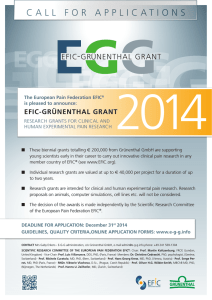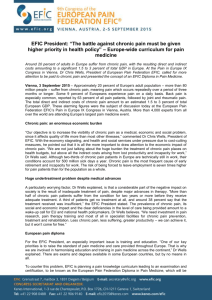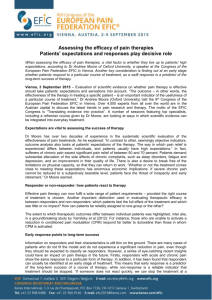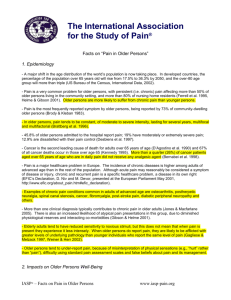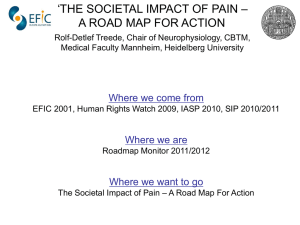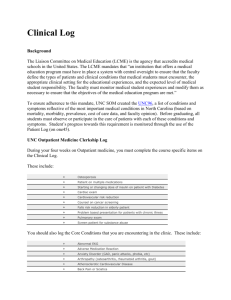Symposium “Societal Impact of Pain” (SIP) at the 9 th
advertisement
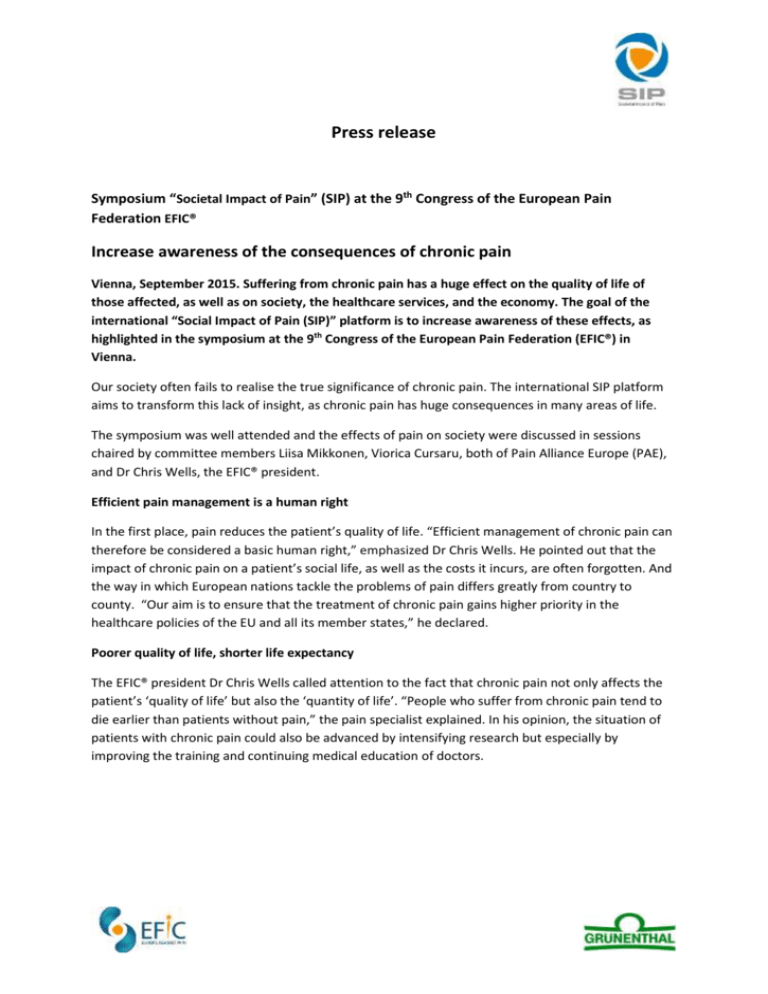
Press release Symposium “Societal Impact of Pain” (SIP) at the 9th Congress of the European Pain Federation EFIC® Increase awareness of the consequences of chronic pain Vienna, September 2015. Suffering from chronic pain has a huge effect on the quality of life of those affected, as well as on society, the healthcare services, and the economy. The goal of the international “Social Impact of Pain (SIP)” platform is to increase awareness of these effects, as highlighted in the symposium at the 9th Congress of the European Pain Federation (EFIC®) in Vienna. Our society often fails to realise the true significance of chronic pain. The international SIP platform aims to transform this lack of insight, as chronic pain has huge consequences in many areas of life. The symposium was well attended and the effects of pain on society were discussed in sessions chaired by committee members Liisa Mikkonen, Viorica Cursaru, both of Pain Alliance Europe (PAE), and Dr Chris Wells, the EFIC® president. Efficient pain management is a human right In the first place, pain reduces the patient’s quality of life. “Efficient management of chronic pain can therefore be considered a basic human right,” emphasized Dr Chris Wells. He pointed out that the impact of chronic pain on a patient’s social life, as well as the costs it incurs, are often forgotten. And the way in which European nations tackle the problems of pain differs greatly from country to county. “Our aim is to ensure that the treatment of chronic pain gains higher priority in the healthcare policies of the EU and all its member states,” he declared. Poorer quality of life, shorter life expectancy The EFIC® president Dr Chris Wells called attention to the fact that chronic pain not only affects the patient’s ‘quality of life’ but also the ‘quantity of life’. “People who suffer from chronic pain tend to die earlier than patients without pain,” the pain specialist explained. In his opinion, the situation of patients with chronic pain could also be advanced by intensifying research but especially by improving the training and continuing medical education of doctors. Actively include the patient in pain management The patient’s situation can generally be improved by actively including patients in pain management, suggested patient representative, Neil Betteridge. Interaction with patients should not be limited to practicing pain therapy as a sort-of ‘repair medicine’. It is far more important to involve patients in their own treatment by working together to determine strategies to combat pain, and thus obliging them to take on an active role. Empowerment, with the patient firmly in the spotlight, is also important. “It must be put to the patients in such a way that they know and understand exactly what is expected of them in this joint venture,” he explained. “And it’s often helpful to include family members in the doctor-patient discussions.” Vast direct and indirect costs According to Dr Mary Baker (past president, European Brain Council), better pain management is certainly to be encouraged in the light of the huge economic burden resulting from chronic pain conditions. And this burden is growing continuously. In Europe in 2004, chronic pain resulted in total costs of 386 billion euro. By 2010, however, this figure had risen to 798 billion euro. About 23% is due to medical treatment, 37% arises from general expenses in pain management, while 40% can be attributed to indirect costs. The cost explosion is largely related to demographic developments and increasing life expectancy. “A girl born in Japan today has a 50% chance of living to be a hundred,” declared Dr Baker. The increasing proportion of ageing and elderly people in society has an effect on the prevalence of diseases associated with chronic pain. And, in the same context, there are growing problems due to the almost inevitable resultant comorbidity and polypharmacy which, according to Dr Baker, make pain management considerably more difficult. About the Societal Impact of Pain (SIP) The "Societal Impact of Pain" (SIP) is an international, multi-stakeholder platform created in 2010 as a joint initiative of EFIC® and the pharmaceutical company Grünenthal GmbH and aims to raise awareness of the relevance of the impact that pain has on our societies, health and economic systems, exchanging information and sharing best-practices across all member states of the European Union, and developing and fostering European-wide and national policy strategies & activities for improved pain management in Europe. The platform provides opportunities for discussion for health care professionals, pain advocacy groups, politicians, insurances, representatives of health authorities, regulators and budget holders. The scientific framework of the SIP platform is under the responsibility of the European Federation of IASP® Chapters (EFIC®). The pharmaceutical company Grünenthal GmbH is responsible for funding and non-financial support (e.g. logistical support). For more information, please visit www.sipplatform.eu About EFIC The European Pain Federation EFIC® is a multidisciplinary professional organisation in the field of pain research and medicine, consisting of the 37 chapters of the International Association for the Study of Pain (IASP®), which are the IASP approved official National Pain Societies in each country. Established in 1993, EFIC’s constituent chapters represent Pain Societies from 37 European countries and close to 20,000 physicians, basic researchers, nurses, physiotherapists, psychologists and other healthcare professionals across Europe, who are involved in pain management and pain research.. For more information, please visit www.efic.org. About Grünenthal The Grünenthal Group is an independent, family-owned, international research-based pharmaceutical company headquartered in Aachen, Germany. We are an entrepreneurial specialist delivering true benefits to patients. By sustainably investing in research and development above the industrial average, we are committing to innovation in order to treat unmet medical needs and bring value-adding products to markets. Grünenthal is a fully integrated research & development company with a long track record of bringing innovative pain treatments and state-of-the-art technologies to patients. Altogether, the Grünenthal Group is present in 32 countries with affiliates in Europe, Australia, Latin America and the US. Grünenthal products are sold in more than 155 countries and approx. 5,200 employees are working for the Grünenthal Group worldwide. In 2014, Grünenthal achieved revenues of € 1.154 bn.
